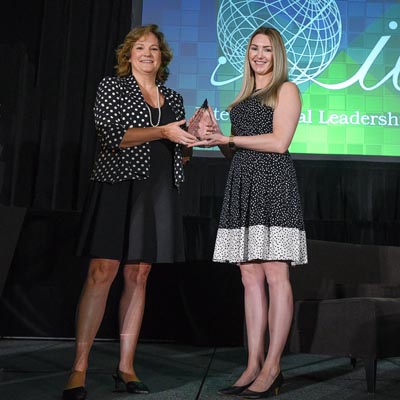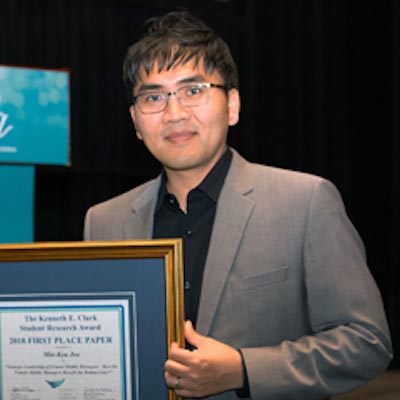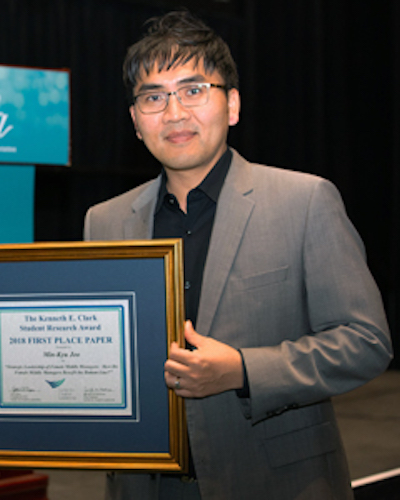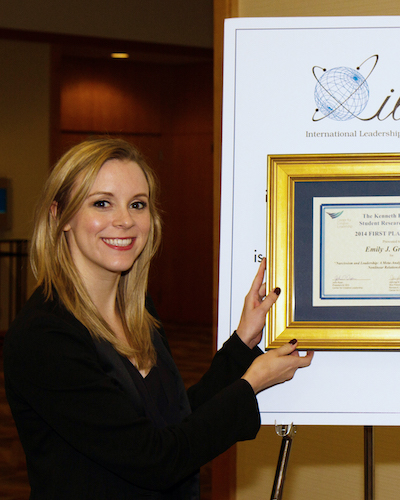The Kenneth E. Clark Student Research Award, 1996-2024
The International Leadership Association (ILA) was pleased to partner with the Center for Creative Leadership (CCL) on the annual Kenneth E. Clark Student Research Award to recognize outstanding unpublished student papers. The award was named in honor of the distinguished scholar and former Chief Executive Officer of the Center. The award program’s final year was 2024. This page celebrates those past winners.


Past Winners of the Kenneth E. Clark Student Research Award
2024

Karryna Madison
Rewrite the Recipe: A Gendered Examination of Social Exchange Theory in Leadership Research
2023

Hsuan-Che (Brad) Huang
“It’s All for Show” Performative Allyship as Saying One Thing but Doing Nothing by Leaders
2022

Suyang Ye
Investigating Boundary Conditions for Shared Leadership – Team Performance Relationship: A Team Leadership Coordination Perspective
2022

Co-Author
Teng Zhao
Investigating Boundary Conditions for Shared Leadership – Team Performance Relationship: A Team Leadership Coordination Perspective
2021

Steven Zhou
Patterns of Leadership Behavior: A Person-Centered Approach to Assessing Leadership Styles Across Gender and Level
2020

Sylvie Plante
Leading Innovation Using Social Capital in Public-Private Partnerships
2019

Samantha A. Penney
Fostering a Psychologically Healthy Workplace Through Leadership
2018

Min-Kyu Joo
Strategic Leadership of Female Middle Managers: How Do Female Middle Managers Benefit the Bottom Line?
2017

Aleka MacLellan
The Role of Leaders in Motivating Their Subordinates at Work
2016

Kyoung Yong Kim
Supportive Leadership: A Conditional Process Model Linking Leadership, Climate, and Horizontal Relationships Between Subordinates
2015

Deirdre P. Dixon
Staying Alive: The Experience of In Extremis Leadership
2014

Emily Grijalva
Narcissism and Leadership: A Meta-Analytic Review of Linear and Nonlinear Relationships
2013
Chenwei Liao
Divergent Effects of Leader-Member Exchange Differentiation on Individual and Group Outcomes: A Multilevel Analysis
2011
Taylor E. Sparks
What Do You Give Me?’ Versus ‘What Do You Mean to Me?’: Exploring the Impact of Ethical Leadership and Abusive Supervision on Employee Well-Being
2011
Brian C. Gunia
The Blame-Taker’s Dilemma: Actions and Reactions in the Wake of Organizational Failure
2010
Dong Liu, Ho Kwong Kwan, Greg Fisher
Founding CEOs’ Core Self-Evaluations and New Venture Performance: A Longitudinal Multilevel Analysis
2009
Marisa Adelman
The Relationship Between Dysfunctional Interpersonal Tendencies, Derailment Potential, and Turnover
2008
Hakan Ener
Leadership Experience and Organizational Learning
2007
Robyn Brouer
The Role of Political Skill in the Leadership Process-Work Outcomes Relationships
2006
Herman Tse
Understanding Leader-Follower and Team-Member Exchange Relationships in Teams: A Multilevel Investigation
2005
Franklin Kudo
Transformational Leadership Development in Adolescent Youth: Authoritative Parenting, and the Mediating Effect of Psychological Autonomy and Mastery Orientation
2004
Lisa Boyce
Propensity for Self-Development of Leadership Attributes: Understanding, Predicting, and Supporting Performance of Leader Self-Development
2003
Marie Dasborough
Cognitive Asymmetry in Employee Affective Reactions to Leadership Behaviors
2002
Nathan Hiller
Understanding and Measuring Shared Leadership in Work Teams
2002 Honorable Mention
Kevin S. Groves
Leader Social and Emotional Skills and Follower Openness to Organizational Change
2002 Honorable Mention
Z. William Todorovic & Francine Schlosser
Understanding the Influence of Leader and Follower Behaviors on a Firm’s Entrepreneurial Orientation – Performance Linkage
2001
Tomas R. Giberson
Embedding Leader Traits: Leadership’s Role
2000
Jeffrey C. Kohles
The Vision Integration Process: Leadership, Communication, and a Reconceptualization of Vision
1999
Michael E. Brown
The Needle in the Haystack: Looking for Ethics in
1998
Sheila Simsarian Webber
Leadership and Trust Facilitating Cross-Functional Team Success
1997
Mohan Thite
Identifying Key Characteristics of Technical Project Leadership
1997
Debra Baker Beck
Called to Service: Developing a Workable Model for Nonprofit and Grassroots Organizations
1996 Graduate Category
Stuart J.M. Weierter
Who Wants to Play Follow the Leader? A Theory of Charismatic Relationships Based on Routinized Charisma and Follower Characteristics
1996 Undergraduate Category
Duane Covrig
Moral Administration: Dealing With Ethical Routines, Challenges and Dilemmas
1996 Undergraduate Category
Marguerite Schneider
A Stakeholder Theory of Managerial Leadership
